
How The Way You Were Raised Shaped Who You Are
Expected read time: 6-8 minutes
Written by: Alishba Mahmood, Specialist in Mental Health Studies (HBSc), University of Toronto
Ever caught yourself feeling…
- Stuck in negative patterns in your relationships or self-worth?
- Struggling with emotions or reactions that seem “automatic” but are confusing or painful?
- A sense of “Why do I act this way?” or “Why do I feel so different from others?”
If I’m describing you, it is likely that some of the challenges you face in relationships, self-esteem, or emotional well-being are linked to the way you were raised by your parents, often without you realizing it.
Aside from genetics and environmental factors, psychologists have revealed that the way your parents raised you and your emotional attachment to them both have a deep impact on your personality and behaviours (Daschle et al., 2023).
- Parenting Styles (proposed by Psychologist, Diana Baumrind):
There are four major parenting styles or ways parents raise their kids, including how they set rules, show love, and respond to their children’s needs and behaviours. - Attachment Styles (proposed by Psychologist, Mary Ainsworth):
There are four common attachment styles or ways you form relationships later in life (i.e. a romantic partner), based on the emotional bond you had with your parents as a child.
While both parenting and attachment styles can overlap or change depending on the situation, understanding them can be an incredibly valuable tool to understanding yourself, and to invite the possibility of changing old patterns and rewriting your story for the better (Wang, 2023).
Overview of Parenting Styles
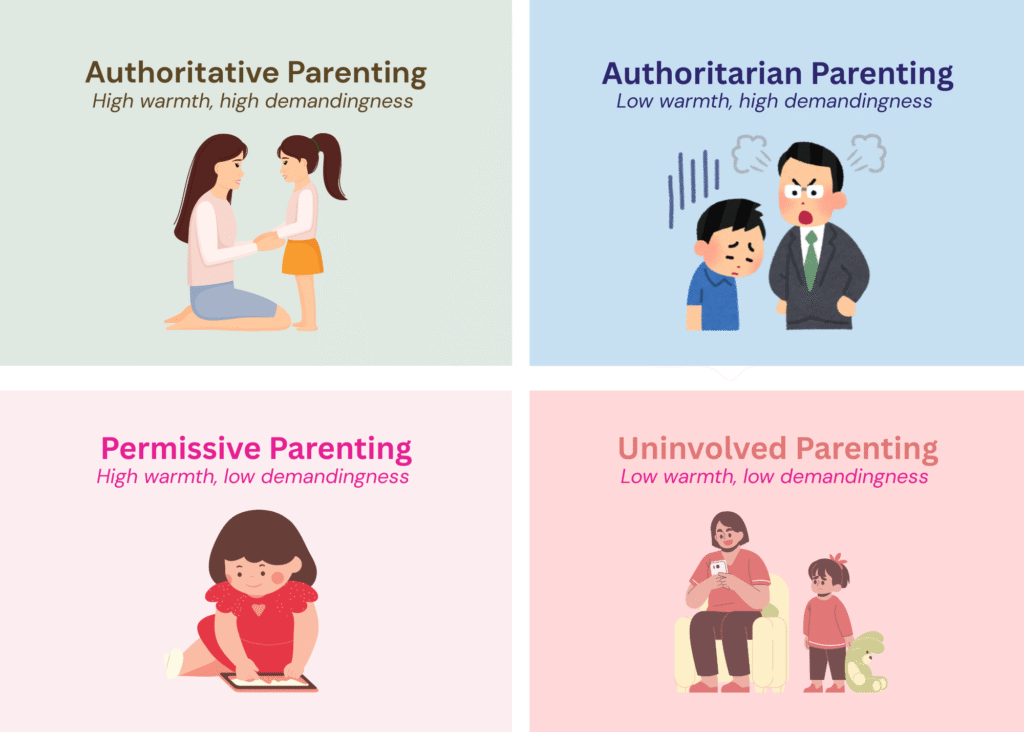
Authoritative Parenting
Authoritative parents maintain a close and nurturing relationship with their child by consistently attending to their needs, setting realistic boundaries and expectations, and practicing open communication.
If you grew up with an authoritative parent, you might’ve been told things like…
“We have rules for a reason. If you don’t feel it’s fair, I’m open to discussing it.”
“Let’s figure this out together.”
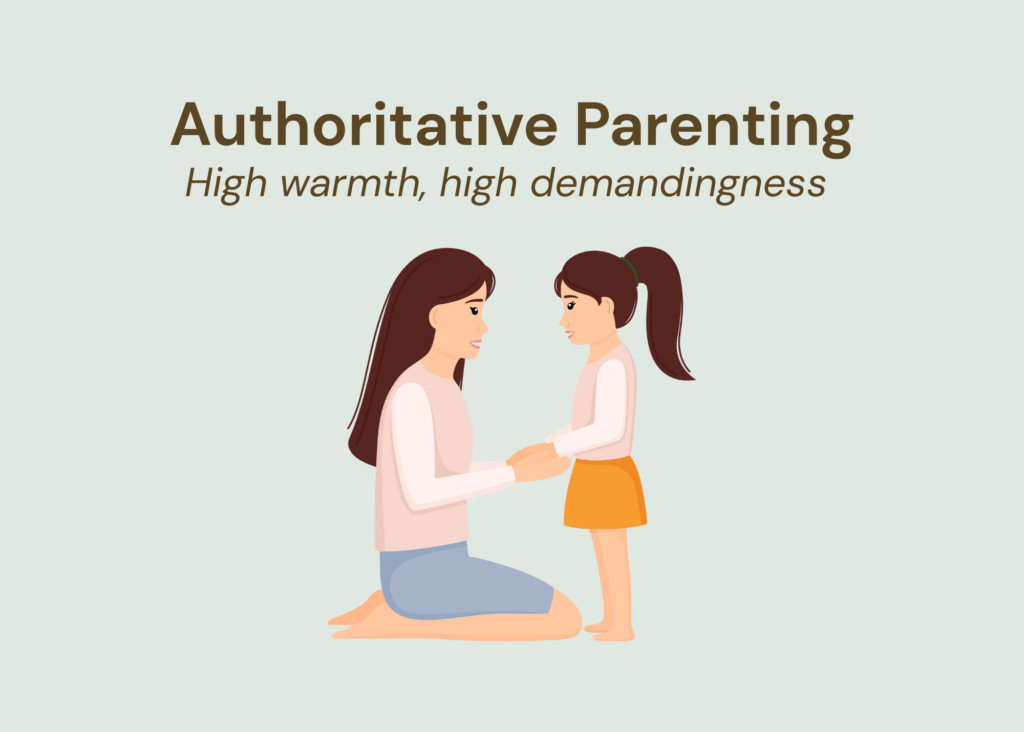
Overall, this approach is known to play a positive role in your mental health, self-esteem, academic success and interpersonal relationships.
In adulthood, you are more likely to be independent, disciplined and foster a sense of responsibility. You may also demonstrate greater resilience against stress and lower levels of anxiety or depressive symptoms (Sanvictores & Mendez, 2022).
In romantic relationships, you are likely to form a secure attachment style with your partner and pursue a long-term relationship where you feel safe and valued. By mimicking the nurturing environment you may have grown up in, you likely set firm boundaries, establish trust, and communicate your needs clearly with your partner (Wang, 2023).
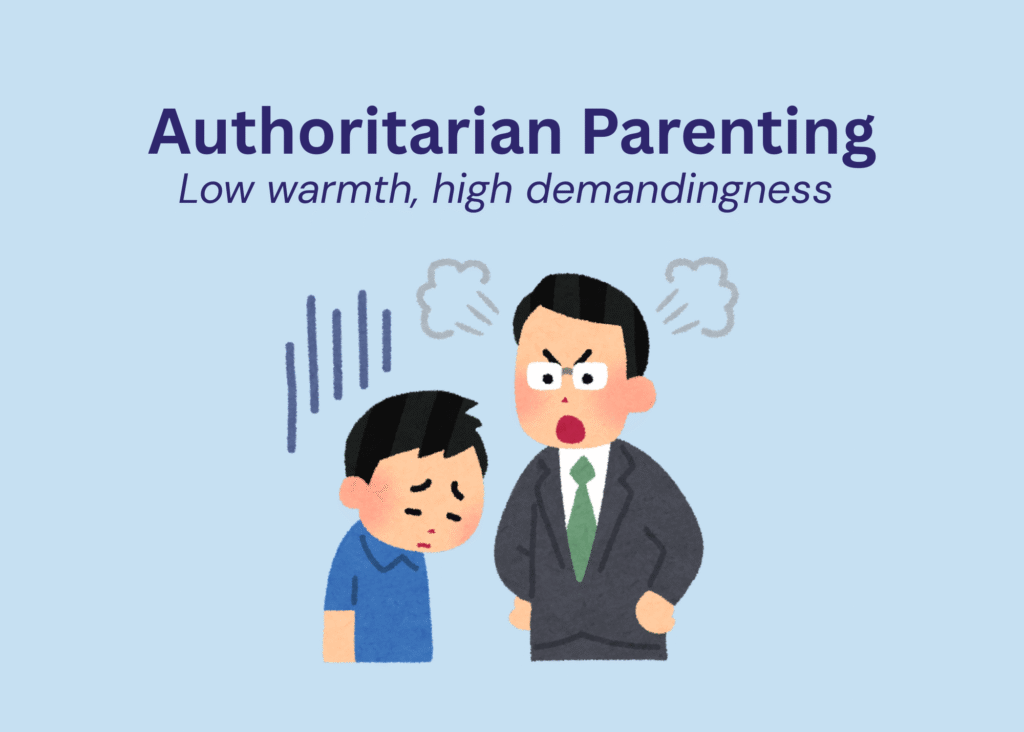
Authoritarian Parenting
Authoritarian parents tend to express limited warmth and emotional closeness with their child. However, they set high expectations and enforce strict rules on them, often relying on punishment rather than an explanation when those rules are broken. They may also try to control important decisions for their child, such as career choices or romantic partners.
If you grew up with an authoritarian parent, you might’ve been told things like…
“I don’t care how you feel, you’re going to do it.”
“Because I said so!”
“I don’t want to hear excuses.”
Overall, this approach is known to play a negative role in your mental health, self-esteem, academic success and interpersonal relationships.
In adulthood, you may tend to struggle with independence and find it difficult to openly express your needs as a result of poor communication with your parents. You may also feel a constant pressure to over-achieve which can contribute to higher levels of stress and depressive symptoms (Sanvictores & Mendez, 2022).
In romantic relationships, you are likely to form an insecure attachment style (i.e. anxious or avoidant attachment). Having grown up in a high-stakes environment, you may feel more inclined to lie to avoid punishment, become dependent on your partner, and lack boundaries (Wang, 2023).
Permissive Parenting
Similar to authoritative parenting, permissive parents maintain a close and nurturing relationship with their child. However, they lack expectations and rules enforced on the child, making it difficult for the child to develop a strong sense of what their healthy values and boundaries are. This parenting approach often allows the child to avoid consequences for their mistakes, reducing opportunities to learn from them and adjust their behavior.
If you grew up with a permissive parent, you might’ve been told things like…
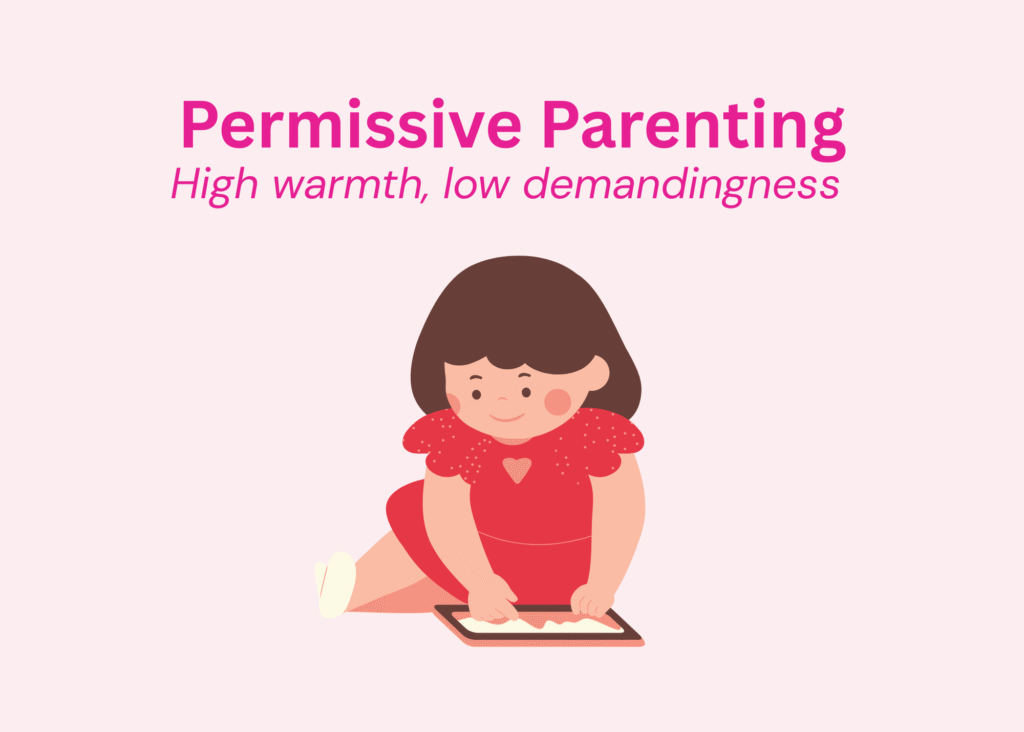
Overall, this approach is also known to play a negative role in your academic success, but a relatively positive role in your self-esteem, mental health, and interpersonal relationships as you might’ve grown up used to having needs met.
In adulthood, you may develop a tendency to overindulge in your desires, which may lead to risky behaviours and challenges in long-term planning. You may also demonstrate poor emotional self-regulation, particularly when your needs are unmet (Sanvictores & Mendez, 2022).
In romantic relationships, you are likely to form a secure attachment style, preferring partners who can reliably meet your needs. However, when these needs go unfulfilled, you may shift towards an anxious attachment style, such as by responding with aggression (Wang, 2023).
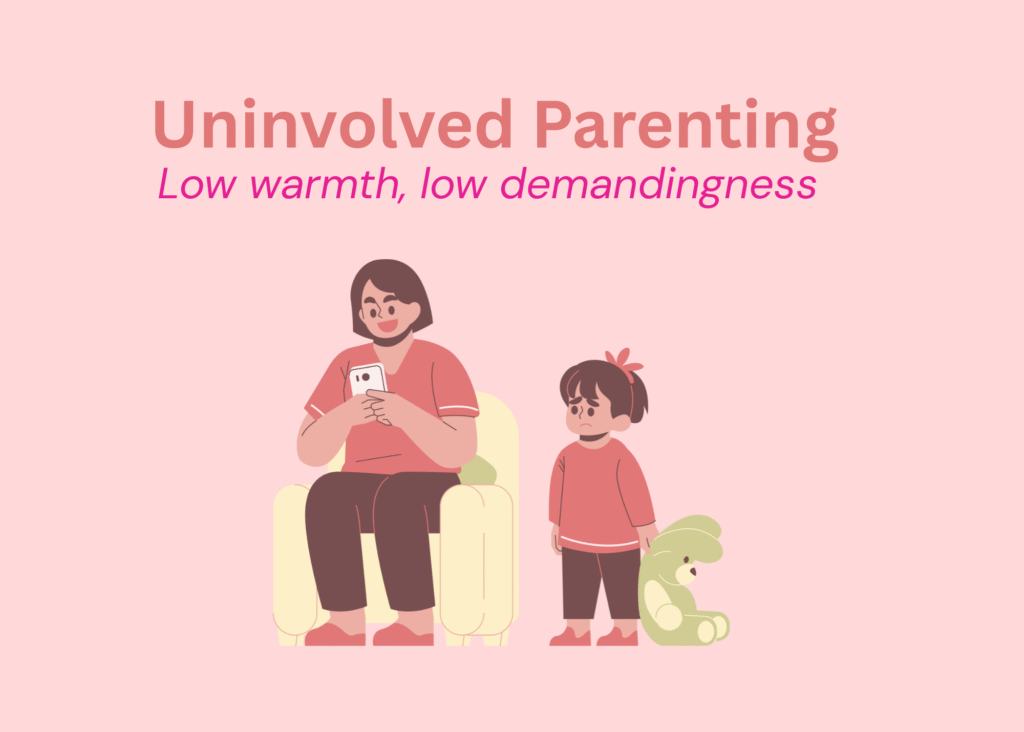
Uninvolved (Neglectful) Parenting
Uninvolved parents often develop a cold and distant relationship with their child in addition to a lack of expectations and rules enforced on the child. As a result, the child is left to navigate the world largely on their own, with little to no supervision.
If you grew up with an uninvolved parent, you might’ve been told things like…
“I don’t care.”
“I don’t have time for you right now.”
“School isn’t my problem. That’s your job.”
Overall, this approach is known to play a negative role in your mental health, self-esteem, academic success and interpersonal relationships.
In adulthood, you demonstrate a higher degree of independence but may struggle with emotional withdrawal, poor emotional regulation, and difficulty trusting others. The absence of boundaries during childhood may also lead to increased attention-seeking or risky behaviours, including a higher likelihood of substance abuse (Zeinali et al., 2011).
In romantic relationships, you are more likely to develop an insecure attachment style (ambivalent/disorganized type). You may want to feel close to your partner and worry about being abandoned, but at the same time, you may struggle with trust and emotional intimacy (Wang, 2023).
Take Away
Although no parenting cycle is 100% perfect, researchers have indicated that an authoritative approach and secure attachment is one of the most effective ways to support a child’s development (Kuppens & Ceulemans, 2018). If you find that the way you were raised was not as secure as these approaches, it is important to remember that you are not bound by the way you were raised. With awareness and the right tools, unhealthy patterns can be unlearned, and healthier ways of growing can always be developed.
Ready to take the next step? Talking to a therapist can help you break free from the patterns that no longer serve you so that you can start a life you truly want.
*Disclaimer: The information in this blog post is for educational and informational purposes only and is not intended as medical advice. Should you have been struggling any emotional or mental health challenges and would like to seek professional helps, please talk to your family physician, or professionals like Registered Social Worker or Registered Psychotherapists.
Reference:
- Agbaria, Q., Mahamid, F., & Veronese, G. (2021). The Association Between Attachment
Patterns and Parenting Styles With Emotion Regulation Among Palestinian
Preschoolers. SAGE Open, 11(1). https://doi.org/10.1177/2158244021989624 - Däschle, J., Hofmann, C.,, Wernicke, J., Ziegenhain, U., Montag, C., Kiefer, M. (2023). The
Relationship Between Parenting Behavior And The Personality Of Kindergarten Children. Frontiers in Psychology, 14. https://doi.org/10.3389/fpsyg.2023.1048391 - Kuppens, S., & Ceulemans, E. (2019). Parenting Styles: A Closer Look at a Well-Known
Concept. Journal of child and family studies, 28(1), 168–181.
https://doi.org/10.1007/s10826-018-1242-x - Pardee, L & Taylor, J. (2025). What Is Your Parenting Style, and Why Does It Matter?
Parents. https://www.parents.com/parenting/better-parenting/style/par
enting-styles-explained/ - Romero-Acosta, K., Gómez-de-Regil, L., Lowe, G. A., Lipps, G. E., & Gibson, R. C. (2021).
Parenting Styles, Anxiety and Depressive Symptoms in Child/Adolescent.
International Journal Of Psychological Research, 14(1), 12–32.
https://doi.org/10.21500/20112084.4704 - Sanvictores, T & Mendez, M.D. (2022). Types of Parenting Styles and Effects on
Children. StatPearls Publishing,
https://www.ncbi.nlm.nih.gov/books/NBK568743/ - What Is Anxious Ambivalent Attachment and What Causes It? (2021). The
Attachment Project. https://www.attachmentproject.com/blog/anxious
-ambivalent-attachment-style/ - Wang, H. (2023). The Influence of Parenting Styles on Attachment Styles and
Parental Influence on Children’s Cognitive Development. SHS Web of
Conferences. 180. 10.1051/shsconf/202318002026. - Zeinali, A., Sharifi, H., Enayati, M., Asgari, P., & Pasha, G. (2011). The Mediational Pathway
Among Parenting Styles, Attachment Styles And Self-Regulation With Addiction
Susceptibility Of Adolescents. Journal Of Research In Medical Sciences: The
Official Journal Of Isfahan University Of Medical Sciences, 16(9), 1105–1121.








